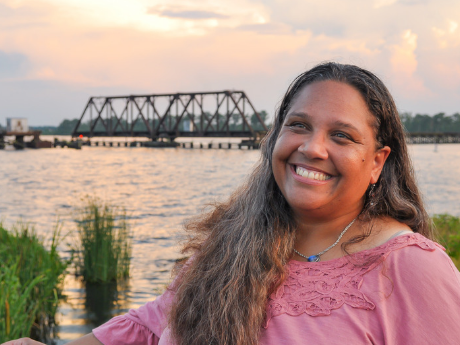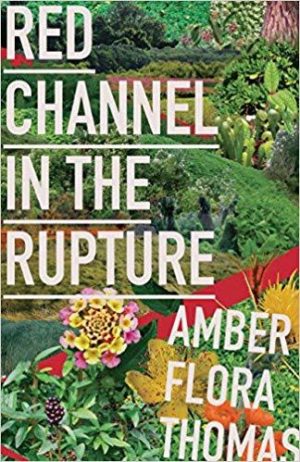In Their Own Words
Amber Flora Thomas on “The Moon That Night”

The Moon That Night
Having eaten your head clean off, my cat
drops your plump carcass on the doormat.
Between blood and purple clots, a bit of neck bone
insists on the air. I lean toward the sharpness,
get right up to the vacant white nipple, like milk
that has contested its cream and been deemed "fat-free."
Transparent like a baby's fingernail, the broken column
spills dead nerves. My cat licks her paw and smack!
your pudgy mass jumps, blood escaping into jute threads.
White like the full moon that night I was twelve
and we snuck up the road. He opened his blue jeans
and thrust his blunt eye at me. It was this
or nothing, he said. I wish I'd chosen nothing.
Later, the moon split the road with redwoods
and I relented to my home. Exhausted,
I didn't swing my arms at the bat stealing moths
above my head.
I didn't wake again until you, little mouse
resting in the middle of "welcome," until my cat
in whose wide green eyes I see myself
leaning from the doorway, and I remember.
From Red Channel in the Rupture (Red Hen Press, 2018). All rights reserved. Reprinted with the permission of the author.
On "The Moon That Night"
I wrote the first draft of this poem soon after I arrived for an artists residency in upper-state New York in July 2010 The entire east coast was in a record-breaking heatwave and more than one person apologized to me for the heat. Earlier in the day, the housekeeper had collapsed from heatstroke and was rushed to the hospital. I was staying on the third floor of the mansion, in a room with two wood desks, a fireplace, and eight bay windows looking east over the grounds.
I'd spent the day traveling across the continent from Fairbanks, Alaska where I taught creative writing at UAF. Between flights and layovers (20 hours total), it was dusk when I shut my room door, leaning for a moment while I surveyed my generous room. Some thoughtful person had opened my windows and turned on a fan, which rotated with minor groaning and clicking, back and forth through the room. Most of the windows had screens, but I noticed the one closest to me lacked a screen and was open wide. I reached into the night and grasped the handle, pulling it toward me, but it wouldn't budge.
This would be my home for the next three weeks. I needed to unpack and take a shower, but I felt dizzy and nauseous. The hours dedicated to writing stretched out in front of me, though I had no idea what I would write. I had finished the poems for my second book, but they needed editing. I wanted to start a new series, but I kept ending up in the same kinds of poems, struggling with memory, worn-out by childhood pain, and focusing on my father.
I woke at some point in the night with waves of nausea gripping me. My sheets were soaked with sweat. I was going to be sick, so I hurried to the shared bathroom outside my room, switching on a florescent light over the tub. Though I'd drank plenty of water throughout the day, I'd managed to get dehydrated anyway. I had only $500 to last me for the full three-weeks, including the return trip to Alaska, so I couldn't afford a co-pay at the ER. I would have to tough it out.
I went back to sleep and woke again an hour or so later to find a bat skimming the air over my bed. A chill shot along my spine and I screamed, throwing my arm over my head and stumbling toward the center of the room. "Get!" I told the bat, "Out!" It landed on the light fixture high above the bed and seemed to be preening its wings. I backed toward the bay windows, keeping it in sight, and tried pushing them wider. I got one to open a few inches more. It was raining gently outside; lightening flashed in the east. I grabbed a towel from the stack on a table at the foot of bed. I held this over my head and hurried toward the room door, slamming it behind me.
The hallway was lit, and closed doors greeted me from end to end. I'd been given a list of numbers in my packet and I knew I could call someone, but I didn't want to be a burden. Did this constitute an emergency? I had to pee, so I turned toward the bathroom, gasping at two brown bats roosting on the doorframe. I backed away slowly. Some movement caught my attention toward the cupola, which stretched almost the length of the hallway. Another bat flitted along the ceiling before zipping outside; the skylight windows were open. Perhaps sensing my presence, the two bats at the bathroom door dropped from the frame and wove around me, before ascending.
I rushed back into my room, choosing the one bat over the many taking up residence in the hallway. I had checked into hell and I would be bitten and get rabies and die a horrible death. What had I gotten myself into? My eyes began to water, and I choked back some tears. Right then, a spasm rolled through my temple and I knew a migraine was coming. I found my bag of emergency pills and pushed a tablet through the aluminum bubble, then let it dissolve under my tongue. I threw the sheet over my head and fell into a fitful sleep, dizziness and exhaustion pouring over me in waves until morning, when I discovered the bat had gone.
It may seem irrelevant to tell the story about where I was when I wrote this poem, but one of the ways poetry holds significance is through the connections the poet makes across time. When I woke with the bat flitting through the air over my head, I felt its shrill notes, not the echolocation, since the human ear can't pick-up echolocation; I felt its vibrations. And, my remembered-self felt vibrations, too. When I was 12 years old and I walked home along Navarro Ridge Road, a bat dove and dove again above my head. I had just given a boy a blowjob, and that experience, too, triggered an avalanche of memories of earlier sexual violence that I had forgotten. Through the smell of semen, the images poured into my consciousness and literally brought me to my knees. It was a whiplash of awful feeling and pictures, most particularly, the group of middle school boys who bribed me to enter the woods next to the playground and took turns forcing their penises into my mouth and on my body. I was five years old. A collage of such memories stretching back to my infancy clipped through my brain.
So, I tried in 2010 to recreate the experience of the whiplash of memory, from a safer distance: adult me remembering that moment in July 1984. The poem occupied a triangle of places: Alaska in summer (via my cat's offering), that night on Navarro Ridge Road, and the undisclosed memories from kindergarten. And, this was as much as I could let the poem hold.
I spent the next few days at my residency recovering from heat-stroke and I wrote the first poems I'd eventually include in Red Channel in the Rupture, many featuring bats. Perhaps sickness lowered my defenses and I could final write more directly about childhood sexual violation. The image that came to me was of the spine protruding from a decapitated vole (changed to a mouse in the poem), which my cat, Cricket gifted me earlier that summer. The tip of the spine reminded me of a penis and the whiteness like semen, and I remembered. The memory could easily pull me into a depression, so I needed the "now" aspects of the poem to contain the past. I needed a structure where the past would not overrun the poem. "The Moon That Night" was my first experience with allowing the "now" to bookend the poem.
The first draft was very close to the version included here, and in the book. I was learning that the past could be contained and managed in the present. I was surprised to find myself fascinated with the decapitated vole. By letting my cat show up in a poem, I was reminding myself that I lived someplace safe now, where I could appreciate the natural order of things. I had survived great violence and violation in childhood, but in the present, a cat killing a rodent was both natural and necessary; this is work we want them to do when we have gardens and homes.
I can see myself stepping from one time into another in "The Moon That Night." Only in the final line do I believe in the existence of these selves, simultaneously negotiating with what is true, both for my body and my life. The more I write with this understanding of time and place, the more I look for opportunities in poems where collision happens between different places and times, where all the resulting selves can co-exist.



